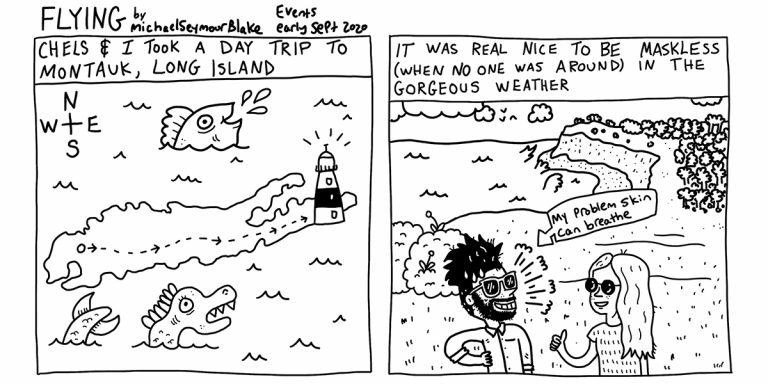
Archives

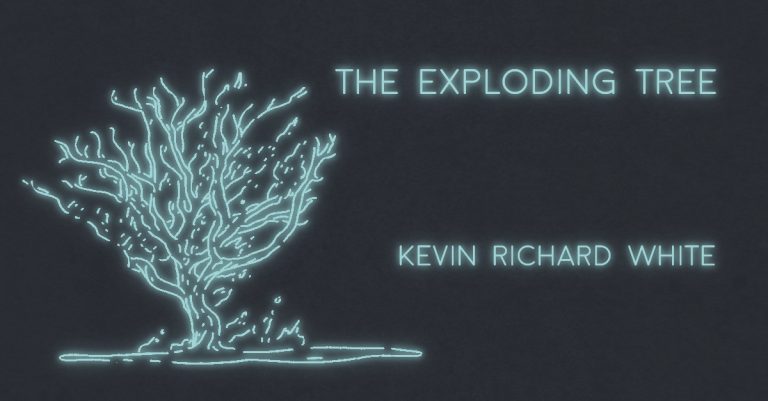
THE EXPLODING TREE by Kevin Richard White
She’s feeding you remains of her meal. Like you’re some animal child. There’s a tattoo of an exploding tree on her back and right shoulder blade: black ink like paint splatter on her smooth skin, roots pulled up, snapped branches, drifting leaves that become new birds. Hair covers it, but not often. One day, you woke up, and it was there. You were angry about it at first, but then you realized you had a lot in common with that tree: You both couldn’t move and had nowhere to go fast. You open your mouth. You want more of the
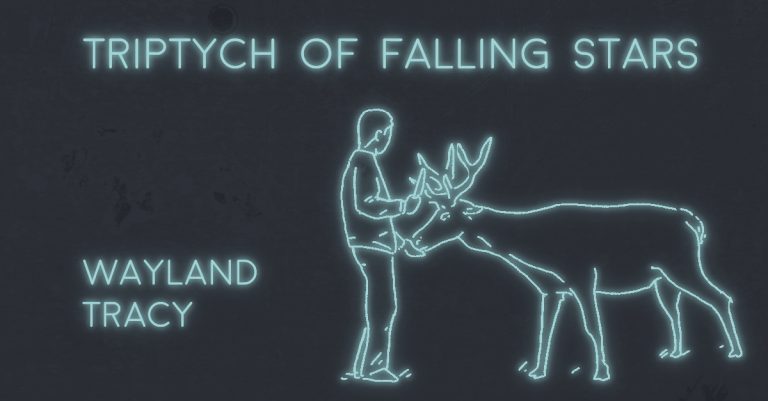
TRIPTYCH OF FALLING STARS by Wayland Tracy
Every night I hear the screams of myself far away. I beg for help but I will not help. In a ditch by the tracks, full of golf balls and bones of careless creatures. White quartz set in circles. I lie down and I am falling. Can’t find the earth. The noises of town rattle like deathbed confessions. Trains hurtle past. The stars encroach. We once had lights that prolonged days. I scrounge for bones with meat clinging on. I once had a table. Pictures of people stuffed into cracked walls, maps that do not help me. No children anymore.
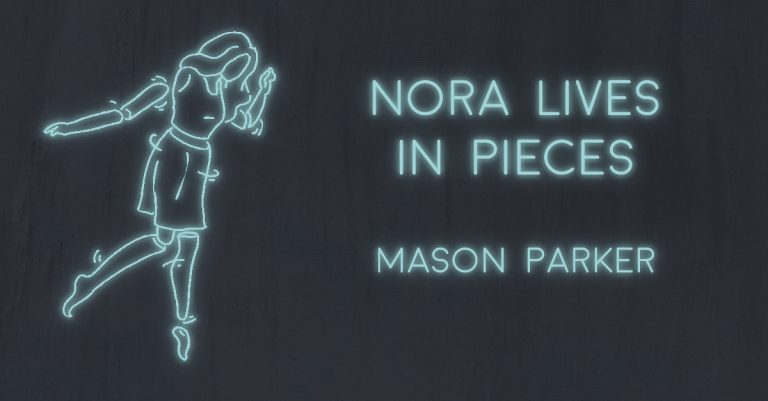
NORA LIVES IN PIECES by Mason Parker
Everything crashed into its true form following the blackout in New Orleans when Nora missed her flight and we drove to Little Rock, buzzing as trashy manic fairies. The Ozarks flopped and rolled, redefining themselves every few miles. Nora had proposed to me after pissing on the fence of an electrical transfer station somewhere outside of Austin where the grass grew through the chain link. I laughed at her, and she said, “I’m fucking serious, mate.” “You wouldn’t want to marry me, Nora.” “Fuck man, I love America. We could get dual citizenship.” “It wouldn’t be worth it. I’m a
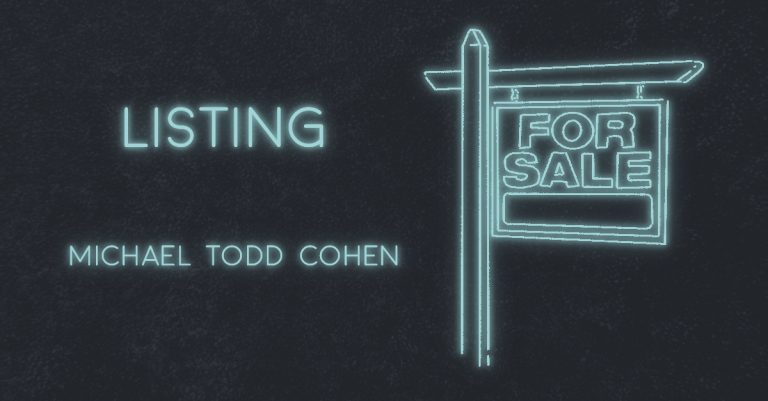
LISTING by Michael Todd Cohen
MARBLEHEAD, MA — ESTATE SALE BY YOUNGEST SON 4 bedroom / 4.5 bath with 5,679 sq ft. of ample space for nuclear family on .26 acres. Below listed are the items for sale and a description of the property. Not listed but offered for the specific buyer: being told as a child you would be disowned if gay. BASEMENT Offered in sale: workbench at which father and youngest son built miniature soapbox derby car for Cub Scout competition. Mostly father—who hip-checked son saying, “watch out, watch out,” as his hulky frame jostled miniature car parts into a sleek red bullet.
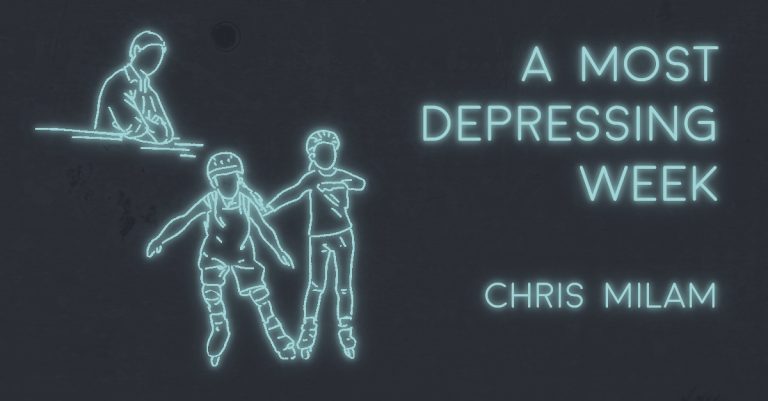
A MOST DEPRESSING WEEK by Chris Milam
Monday I tell my therapist that her milkshake brings all the depressives to the yard. She laughs. I laugh. I don’t tell her I spent hours the night before trying to think of something funny to say to her. I also think: I love you. I think: you plus me equals happiness. I think: when does this session end? I think: I want to sleep with you to help murder the pain. She goes on about reframing or something. I’m still focusing on my joke. Time’s up. Fuck. Tuesday A murder case on Dateline. A beautiful wife is found dead
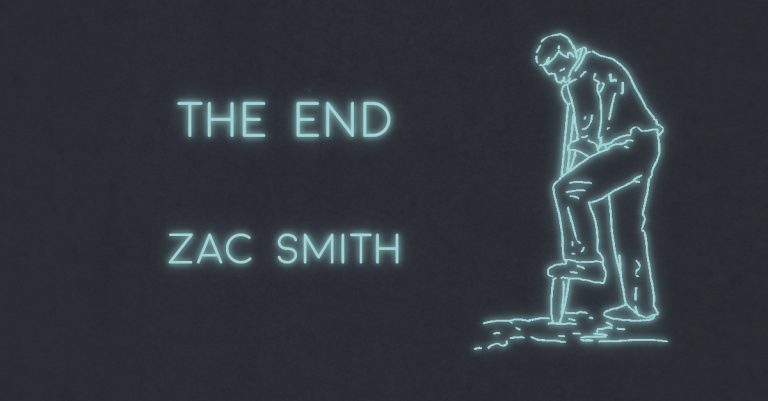
THE END by Zac Smith
The seasonal jobs came back to town aboard a gleaming, diesel caravan. We all stepped up to carry water and dirt and to do all the other things that would be asked. Brought our resumes, our lunch boxes, our good gloves. Someone was going to see us, buy our labor for a week or month—see something useful in the junk, like Giacomo did as a dropout teen, buying a rusted-out chainsaw to bond with mom and get it running again. And just like that ideation, we’d take off for somewhere else full of better promises. This we knew, believed, felt,
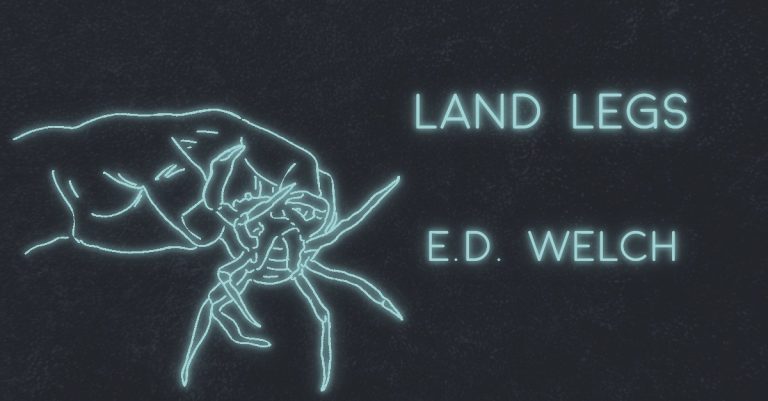
LAND LEGS by E.D. WELCH
Bittersweet day, this final one together. Frighteningly agenda-less, we wander through the aisles of small, art-filled stores, awkward in each other’s company, unaccustomed to hanging out like this. “Do you want to go into this one?” I ask him at each store. “I don’t care.” His only reply. I learn he likes art galleries—oil paintings, to be exact. I didn’t know. Our aimlessness leads us eventually to the beach, where we find our land legs again. The beach: yes, we spent many, many hours at the beach together during his childhood, so this we know how to do. He shows

RIDING A BIKE THROUGH THE LONELY CONTINUUM OF TIME by Christian Fennell
His name was Leonard. He was riding a bike. His arms held out to the sides of him, his mind never trapped by his own self, never buckling under the weight of what he should be, or shouldn’t be, understanding the truth of himself, always, in this world, hard as that was, and of course, in this moment too, riding a bike through the lonely continuum of time. He smiled at his knowing, where others couldn’t—or fucking wouldn’t, and he was right, and knew he was right, and always would be. He rode on, his arms still there, to the
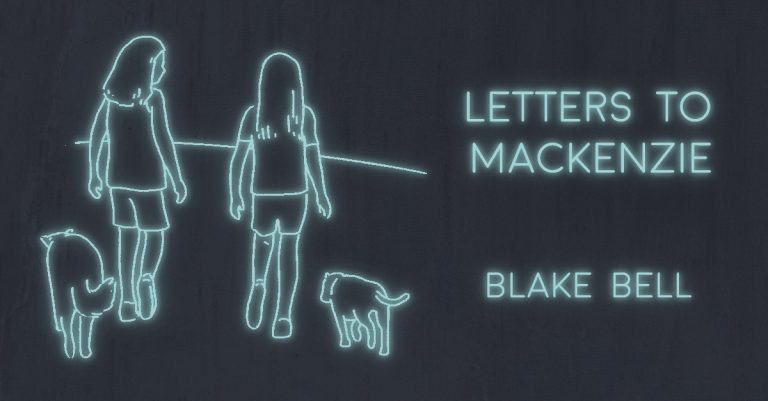
LETTERS TO MACKENZIE by Blake L. Bell
I We were wild girls. Raised with dirty feet, tangled hair. Our dogs followed us down the roads we walked, but our mommas rarely did. We played hard, fought hard, loved hard. Fate cheated us from being sisters, so we bound ourselves together with blood ritual. We couldn’t go downstairs to the kitchen to get a knife, afraid of waking momma. Instead, we broke a jar in the upstairs bathroom and sliced our thumbs open; our skin peeled back, vessels bursting and spilling over. We pressed our cuts together and imagined our blood forever combined. “Soul sisters,” we said, sucking
